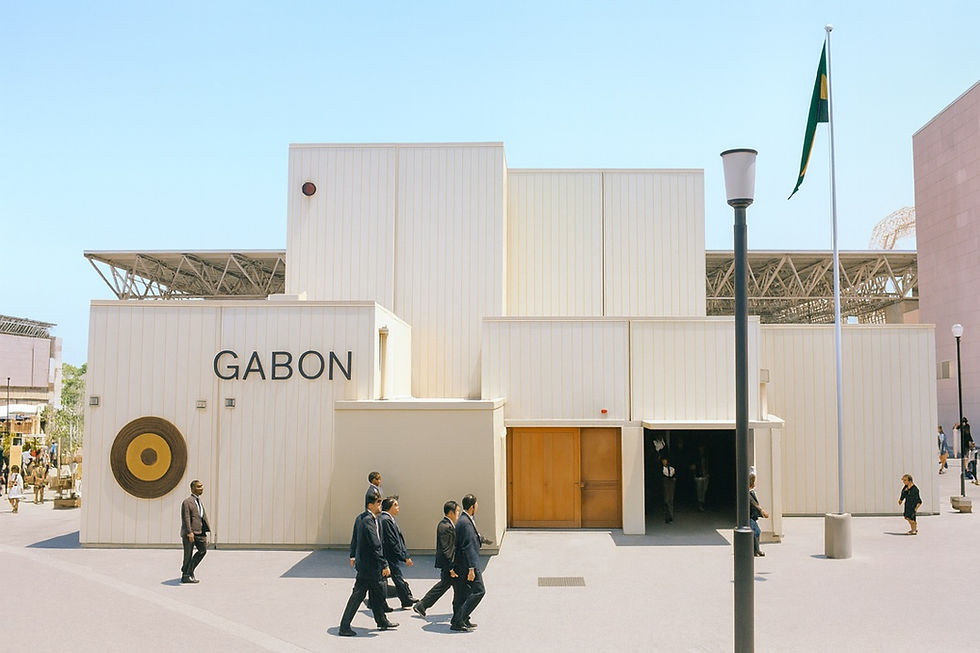Conference-Debate: Iboga, Sacred Plant and Traditional Medicine - Benefits and Controversies for Gabonese Cultural Heritage
- Mavikana
- Dec 2, 2024
- 4 min read
On November 30, 2024, the National Museum of Libreville hosted a conference-debate dedicated to a subject of great importance to Gabonese cultural heritage: "Iboga, Sacred Plant and Traditional Medicine: Benefits and Controversies". This event, attended by Dr. Yoan MBOUSSOU, president of the NGO Gabon Terre d'Avenir (GTA) and an expert in microbiology, provided a unique platform to examine in depth the issues related to the valorization of iboga, a unique and central resource at the heart of Gabonese culture. Iboga, a true botanical treasure, holds cultural, spiritual, and medicinal significance. Its use is deeply rooted in Gabon's traditional practices, and its potential in contemporary medicine warrants thorough exploration.

Dr. MBOUSSOU provided a detailed analysis of the potential benefits of this plant, as well as the controversies surrounding its use. Iboga is renowned for its psychotropic and medicinal properties, particularly in the treatment of addictions—an aspect that is gaining growing international interest. The ability of iboga to induce altered states of consciousness and promote healing from emotional trauma and addiction has made it an increasingly popular topic of research among the scientific and medical communities. In particular, the conference highlighted the commercialization of Mayay capsules, which have benefited from a Marketing Authorization (AMM) issued by the Gabonese Medicines Agency since 2022, as a Traditional Improved Medicine (MTA). This regulatory milestone represents a major step forward in the recognition of indigenous knowledge and opens up promising prospects for the emergence of Gabonese medicine on the international stage. The Mayay capsules present an opportunity to capitalize on the therapeutic properties of iboga while making them accessible to a broader public in a safe and regulated environment.

This conference also provided an opportunity to reaffirm Gabon Terre d'Avenir's commitment to support the government in the regulation and standardization of procedures governing the exploitation and commercialization of iboga, a strategic resource that requires careful and ethical management. This support aims to ensure sustainable and respectful exploitation of the traditions while ensuring that the economic benefits flow directly to local communities and contribute to their development. Local communities, as custodians of ancestral knowledge, are at the heart of this approach, and their involvement is crucial to ensuring the transmission of knowledge and the sustainable management of this resource. Gabon Terre d'Avenir strives to create a framework of cooperation between local stakeholders, authorities, and researchers, in order to reconcile the preservation of traditional knowledge with economic development.
The debates were enriched by contributions from Professor Bourobou Bourobou and traditional practitioner Tah Mombo, two emblematic figures in the defense of Gabonese traditional knowledge. Their contributions underscored the spiritual significance of iboga in initiation rites, while emphasizing the importance of preserving the cultural practices associated with this plant. In rites of passage and spiritual ceremonies, iboga is considered an essential vector for connection with ancestors and understanding the spiritual world. Professor Bourobou Bourobou stressed the need to document these practices in order to guarantee their transmission to future generations, while Tah Mombo shared poignant stories about the experience of young initiates, highlighting the transformative impact of iboga on their understanding of life and integration into the community. Their speeches highlighted that, in the Bantu worldview, nature is far more than a mere resource to be exploited: it is a sacred entity deserving of respect and reverence. The intrinsic relationship between humans and nature, mediated by iboga, illustrates a philosophy of life that values balance, environmental respect, and harmony with natural elements.
Since its inception, the NGO Gabon Terre d'Avenir has advocated for the equitable integration of traditional communities into sustainable development projects, particularly in the forests of the Congo Basin, and for the promotion of initiatory tourism. These forests, true lungs of the planet, harbor exceptional biodiversity as well as invaluable traditional knowledge. The objective is to make Gabon a destination of choice for travelers seeking authentic and deeply rooted spiritual experiences in Bantu culture. By promoting this sacred relationship between humans and nature, Gabon can also emerge as a central player in a green economy that combines respect for traditions with sustainable development. Initiatory tourism is perceived as a strategic lever, not only to generate income for local communities but also to educate international visitors about the importance of preserving these unique ecosystems. Through the proposed tourist circuits, visitors have the opportunity to engage in immersive experiences, participate in traditional ceremonies, and gain a deeper understanding of Gabonese spirituality and its relationship to the sacred.

The audience present at this event was encouraged to actively participate, contributing to rich and varied exchanges on contemporary and traditional uses of iboga, its medicinal potential, and the ethical and environmental challenges of its preservation. Among the topics discussed, the issue of standardizing iboga extracts for controlled medical use sparked numerous discussions. Some participants stressed the importance of establishing rigorous protocols for the extraction and formulation of iboga, to ensure its safety and efficacy in a modern therapeutic setting. Others emphasized the need to respect the cultural and spiritual dimensions of iboga use, reminding us that this plant cannot be reduced to a mere active molecule without losing part of its essence.
These discussions also served to reaffirm GTA's mission: to protect, promote, and advance this invaluable cultural heritage for the benefit of present and future generations. The NGO renewed its commitment to work closely with Gabonese authorities, local communities, and international researchers to develop strategies for valorizing iboga that are ethical, sustainable, and respectful of traditions. The integration of traditional knowledge into public policies, the establishment of training programs for young generations on the use and cultivation of iboga, and the promotion of collaborative and inclusive scientific research are all priority areas for the future.

#Iboga #TraditionalMedicine #Gabon #CulturalHeritage #InitiatoryTourism #Mayay #SustainableDevelopment #CongoBasinForests #GabonTerredavenir #BantuSpirituality #SacredHeritage #IbogaConference #DrYoanMboussou #TraditionAndModernity #GreenEconomyGabon #SpiritualInitiation #GaboneseBiodiversity #EthicalTourism #AncestralMedicine #CulturalConservation










Comments